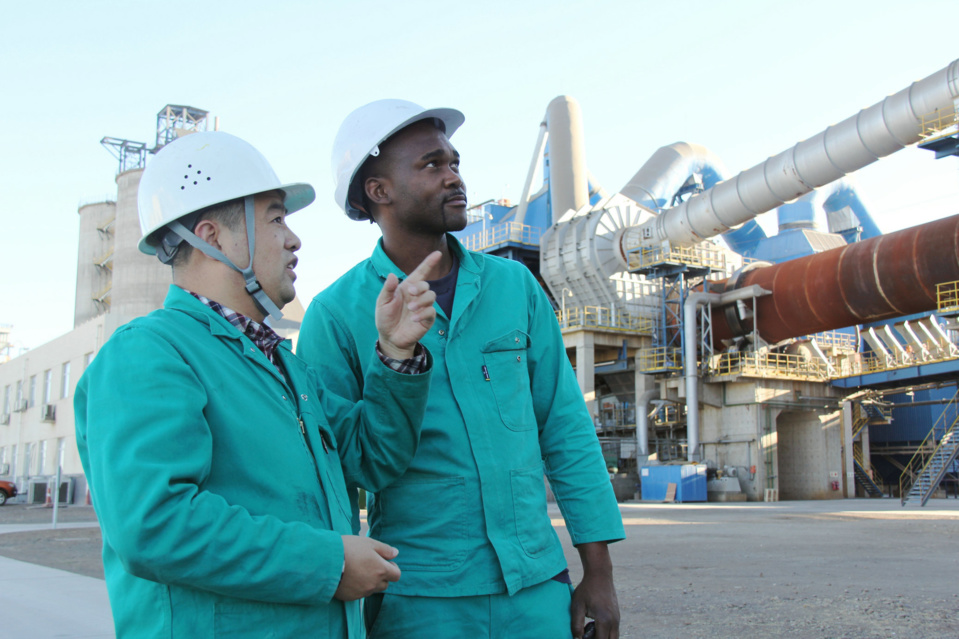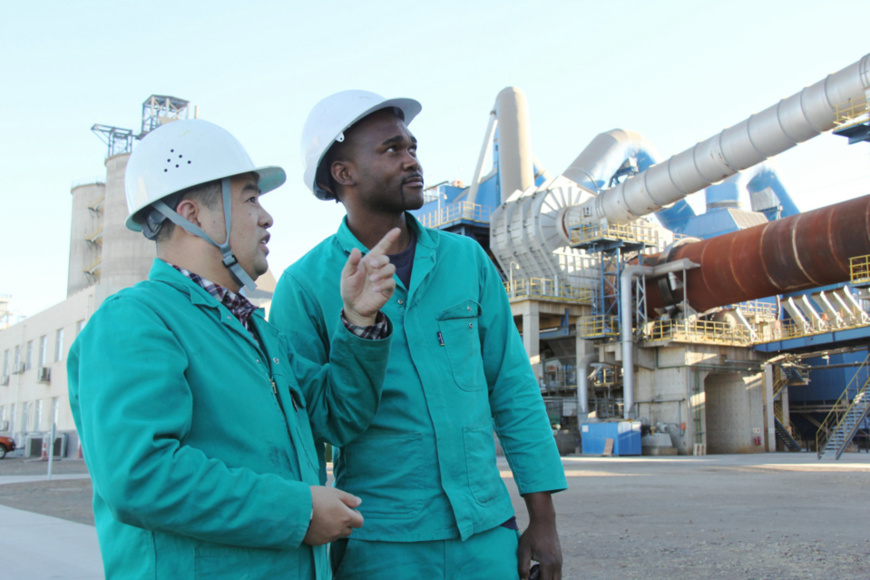By Li Zhiwei from People’s Daily
China and Africa, over the past three years, have yielded rich fruits from their cooperation in industrialization, a significant area to propel Africa’s social development, economic transformation, and improvement of people’s livelihood.
Those results also constitute an impressive part of the positive progress both sides made from their efforts to implement the ten major China-Africa cooperation plans which were put forward three years ago.
Over the past years, much dependent on exporting energy, mineral resources and primary products, African countries did not have a fairly integrated industrial system, thus making it hard to start up large-scale infrastructure projects. What’s worse, their economic structure usually become more vulnerable when faced with the price fluctuation of international commodities.
African leaders have been aware that they could not truly achieve economic transformation and economic independence, or release huge development potential without industrialization.
Against such background, they have listed a long-term strategy in the Agenda 2063 of the African Union (AU), in a hope of accelerating Africa’s economic transformation, increasing the added value of African resources and people’s income through industrialization process, especially the growth of manufacturing sector.
The sufficient labor and natural resources have put Africa in front of a broad prospect of win-win cooperation and common development with China, who has technologies, equipment, talents and capital needed for Africa to achieve industrialization.
Industrialization is the only path for Africa’s development, said Funeka Yazini April, a research specialist at the Human Sciences Research Council (HSRC) in South Africa, adding that China-Africa cooperation is a key to Africa’s development.
“China built industrial parks in Africa to transfer technology, create jobs for the locals, and increase the added value of local products. There is no reason not to welcome China,” said Namibian President Hage Geingob.
Thanks to the priority China gives to Africa’s industrialization when cooperating with the latter in the new era, Africa has moved a big stride forward to tackle its two major development bottlenecks, namely the backward infrastructure and talent shortage.
After the China-constructed standard-gauge railway connecting landlocked Ethiopia to Djibouti opened to traffic, its freight and passenger traffic have rose and an industrial corridor has taken shape along the route as a result.
The Addis Ababa-Djibouti rail line, built and operated by China Civil Engineering Construction Corporation (CCECC), a subsidiary of China Railway Construction Corp (CRCC), is also Africa’s first and longest transnational electrified railway.
After Djibouti International Free Trade Zone was opened in early July, the China Merchants Group-backed zone has attracted over 20 African and Chinese enterprises to sign the letter of intent to enter the zone.
The free trade zone would bring welfare to local people, Djibouti President Ismail Omar Guelleh noted, elaborating that it would not only increase job opportunities, but also introduce the export processing industry to Djibouti, providing continuous impetus for the country’s economy.
In Ethiopia, Chinese enterprises have engaged in the construction of the majority of the more than 10 new industrial parks led by local government. The CCECC-built Hawassa Industrial Park, an emission-free zone with 52 standardized plants, has directly created nearly 20,000 jobs for locals.
The success of the park has not only greatly boosted the confidence of the Ethiopian government in industrialization drive, but also introduced the management experiences of Chinese companies on industrial park to Africa.
China-Africa industrialization cooperation has brought more and more tangible benefits to Africans. The rural population on the continent is now flowing to manufacturing sector because of the factories and enterprises invested by Chinese companies.
In this March, a foundation-laying ceremony for the China-Africa Textile Company was held in Salima, 100 kilometers from Lilongwe, the capital city of Malawi.
The project makes the dream of changing Malawi economic model from importing for consumption to exporting production come true, Malawian President Peter Mutharika said when extending his gratitude to China.
He noted that the textile mill would have a positive impact on the Malawian economy, as the products could be exported to neighboring countries and international markets, and it would also improve the rural residents’ living standard and create numerous jobs.
Where there are Chinese factories and projects, there are young Africans full of passion and energy. It is a situation commonly seen in more than 20 African countries.
The Huajian Shoe factory in Ethiopia, for instance, employs about 8,000 local workers, making itself the country’s largest foreign employer.
The Hebei Iron and Steel Group hires more than 2,400 workers in its steel plant in South Africa, with only eight Chinese employees. Many factories invested by Chinese companies in Africa have grown into business and employment centers.
The South Africa plant of Beijing Automotive Industry Corp (BAIC), a joint venture between BAIC and South Africa’s state-owned Industrial Development Corp, is a cooperation project signed by the two partners at the witness of Chinese President Xi Jinping and his South African counterpart during Xi’s second state visit to South Africa in December 2015.
It is learnt that the plant, which could produce 50,000 cars each year upon completion of its first-phase project, will be the largest single investment in the automobile industry of South Africa and even of the whole of Africa after its operation.
After reaching the designed production, its added value of the whole vehicle and parts business will climb to about 18.6 billion yuan, which will contribute about 6.2 billion yuan to the exports of South Africa.
Statistics indicates that China has been Africa’s largest trading partner for 9 consecutive years, with the investment to Africa totaling over $100 billion.
The achievements of China-Africa industrialization cooperation can be seen everywhere, said China’s Ambassador to South Africa Lin Songtian, adding that a large number of projects including railways, ports and industrial parks have been completed, which significantly accelerated Africa’s industrialization drive and showed a strong momentum of rapid development.
Lin believes that China has become and will continue to be the most reliable friend and partner of Africa, helping African countries to achieve sustainable development.
Those results also constitute an impressive part of the positive progress both sides made from their efforts to implement the ten major China-Africa cooperation plans which were put forward three years ago.
Over the past years, much dependent on exporting energy, mineral resources and primary products, African countries did not have a fairly integrated industrial system, thus making it hard to start up large-scale infrastructure projects. What’s worse, their economic structure usually become more vulnerable when faced with the price fluctuation of international commodities.
African leaders have been aware that they could not truly achieve economic transformation and economic independence, or release huge development potential without industrialization.
Against such background, they have listed a long-term strategy in the Agenda 2063 of the African Union (AU), in a hope of accelerating Africa’s economic transformation, increasing the added value of African resources and people’s income through industrialization process, especially the growth of manufacturing sector.
The sufficient labor and natural resources have put Africa in front of a broad prospect of win-win cooperation and common development with China, who has technologies, equipment, talents and capital needed for Africa to achieve industrialization.
Industrialization is the only path for Africa’s development, said Funeka Yazini April, a research specialist at the Human Sciences Research Council (HSRC) in South Africa, adding that China-Africa cooperation is a key to Africa’s development.
“China built industrial parks in Africa to transfer technology, create jobs for the locals, and increase the added value of local products. There is no reason not to welcome China,” said Namibian President Hage Geingob.
Thanks to the priority China gives to Africa’s industrialization when cooperating with the latter in the new era, Africa has moved a big stride forward to tackle its two major development bottlenecks, namely the backward infrastructure and talent shortage.
After the China-constructed standard-gauge railway connecting landlocked Ethiopia to Djibouti opened to traffic, its freight and passenger traffic have rose and an industrial corridor has taken shape along the route as a result.
The Addis Ababa-Djibouti rail line, built and operated by China Civil Engineering Construction Corporation (CCECC), a subsidiary of China Railway Construction Corp (CRCC), is also Africa’s first and longest transnational electrified railway.
After Djibouti International Free Trade Zone was opened in early July, the China Merchants Group-backed zone has attracted over 20 African and Chinese enterprises to sign the letter of intent to enter the zone.
The free trade zone would bring welfare to local people, Djibouti President Ismail Omar Guelleh noted, elaborating that it would not only increase job opportunities, but also introduce the export processing industry to Djibouti, providing continuous impetus for the country’s economy.
In Ethiopia, Chinese enterprises have engaged in the construction of the majority of the more than 10 new industrial parks led by local government. The CCECC-built Hawassa Industrial Park, an emission-free zone with 52 standardized plants, has directly created nearly 20,000 jobs for locals.
The success of the park has not only greatly boosted the confidence of the Ethiopian government in industrialization drive, but also introduced the management experiences of Chinese companies on industrial park to Africa.
China-Africa industrialization cooperation has brought more and more tangible benefits to Africans. The rural population on the continent is now flowing to manufacturing sector because of the factories and enterprises invested by Chinese companies.
In this March, a foundation-laying ceremony for the China-Africa Textile Company was held in Salima, 100 kilometers from Lilongwe, the capital city of Malawi.
The project makes the dream of changing Malawi economic model from importing for consumption to exporting production come true, Malawian President Peter Mutharika said when extending his gratitude to China.
He noted that the textile mill would have a positive impact on the Malawian economy, as the products could be exported to neighboring countries and international markets, and it would also improve the rural residents’ living standard and create numerous jobs.
Where there are Chinese factories and projects, there are young Africans full of passion and energy. It is a situation commonly seen in more than 20 African countries.
The Huajian Shoe factory in Ethiopia, for instance, employs about 8,000 local workers, making itself the country’s largest foreign employer.
The Hebei Iron and Steel Group hires more than 2,400 workers in its steel plant in South Africa, with only eight Chinese employees. Many factories invested by Chinese companies in Africa have grown into business and employment centers.
The South Africa plant of Beijing Automotive Industry Corp (BAIC), a joint venture between BAIC and South Africa’s state-owned Industrial Development Corp, is a cooperation project signed by the two partners at the witness of Chinese President Xi Jinping and his South African counterpart during Xi’s second state visit to South Africa in December 2015.
It is learnt that the plant, which could produce 50,000 cars each year upon completion of its first-phase project, will be the largest single investment in the automobile industry of South Africa and even of the whole of Africa after its operation.
After reaching the designed production, its added value of the whole vehicle and parts business will climb to about 18.6 billion yuan, which will contribute about 6.2 billion yuan to the exports of South Africa.
Statistics indicates that China has been Africa’s largest trading partner for 9 consecutive years, with the investment to Africa totaling over $100 billion.
The achievements of China-Africa industrialization cooperation can be seen everywhere, said China’s Ambassador to South Africa Lin Songtian, adding that a large number of projects including railways, ports and industrial parks have been completed, which significantly accelerated Africa’s industrialization drive and showed a strong momentum of rapid development.
Lin believes that China has become and will continue to be the most reliable friend and partner of Africa, helping African countries to achieve sustainable development.
 Menu
Menu
 China- Africa industrialization cooperation has yielded fruitful results
China- Africa industrialization cooperation has yielded fruitful results

















